The Interior Read online
Page 43
“Can you show me one thing that we did that wasn’t done somewhere along the line in America’s rise to prominence?” she asked. “Look back at your history. Your growth was accomplished on the backs of slaves. You were able to finish your westward migration because of the work my countrymen did building the railroad. And you didn’t limit yourselves to people of—how do you so euphemistically call it?—people of color. No, you sent women and children into factories and into mines.”
“All that was a long time ago.”
“But today, looking back from a position of world domination and tremendous prosperity, wouldn’t you have to say that the ends justified the means?”
“And what were you going to get out of it?”
Amy sneered. “You still don’t see it? With Henry and Sun out of the way, we could do anything. I helped Doug, he helped me. Doug wanted your company,” she said, acknowledging Henry. “I wanted the governorship.”
Amy’s confession, for what it was worth, gained her little but some soap, toothpaste, the promise of bottled water, and a towel.
One day when Hulan’s mother and her nurse had gone to see Dr. Du and David was on a trip to Los Angeles, Hulan heard a ring at the front gate. She padded out through the courtyards and opened the door. Though it was the middle of the day, the alley had been cleared of all people except for a man who announced that her presence was required elsewhere and she should get in the car please. She obeyed, knowing that if she didn’t come back, no one would ever know what had happened to her.
The driver took her through the narrow alleys of the hutong, then popped out on the opposite shore of Shisha Lake from Hulan’s home. Here the driver’s progress stopped while he waited for a flock of Secrets of the Hutongs Special Tourist Agency pedicabs, each loaded with one or two Westerners, to pass. This tour was a new fad in Hulan’s neighborhood, and she wasn’t quite sure how she felt about it. On the one hand, she didn’t like to see so many foreigners in this little enclave; on the other, the success of the state-owned agency might help to keep the neighborhood from being razed. As the sweating pedicab drivers slowly pedaled out of the way, Hulan stared out across the lake. Old men with fishing poles dotted the shore. Just outside her window, three skinny boys took turns jumping into the water. Their hollers, hoots, and squeals came to her on a soft breeze.
The sedan began to move again, and a few minutes later the driver pulled up to a gated compound. Like any traditional compound, the exterior walls were unpainted and gave no indication of hidden wealth. A guard ticked their names off a list, and the driver pulled inside.
Hulan had come here many times as a child and expected the compound to look smaller and less impressive. In fact, she had just the opposite sensation. The grounds were more beautiful than she remembered from those long-ago days. Gingko, camphor, and willow trees created a shadowed oasis. A stream—and Hulan remembered this vividly from playing out there with the other children of high-ranking cadres—meandered along the inside perimeter of the compound. Sponge rocks jutted from the sides of the stream. Stands of bamboo sheltered pavilions and summer houses. Birds chirped and twittered and cooed in the walls of greenery, reminding Hulan that there’d once been a dovecote behind the main house. She wondered if it was still there.
She followed the driver up the steps and into the foyer, which smelled of mothballs and mildew. They passed several formal parlors where the furniture was draped in dingy sheets, then traveled up a back staircase and down a hall with high ceilings. The driver tapped on a heavy door, slowly opened it, and motioned for Hulan to enter. As soon as she did, the door closed behind her. Five men, not one younger than seventy, sat in overstuffed chairs in a semicircle facing her. Each face was as familiar to her as if it had been her father’s. Behind these five men sat two others, Hulan realized as her eyes adjusted to the gloom. One was Vice Minister Zai; the other was Governor Sun.
“Please sit, Inspector Liu Hulan,” the man in the middle said, gesturing gracefully to a straight-back chair. When she hesitated, he added, “Don’t rely on tradition. We know you are still weak. Sit.”
Hulan sat, folded her hands in her lap, and waited. A matronly woman appeared out of the shadows along the wall, poured tea, then backed away again.
“How is your health, Liu Hulan?”
“Very well, sir.”
“And your mother?”
“She is happy to be home.”
“Yes, we have heard this as well. It makes us all so…” The old politician groped for the appropriate word and failed.
Another man said, “So many traditions, eh, Xiao Hulan?” She started. She hadn’t been called Little Hulan since before she’d gone to the Red Soil Farm. “They tell us how to be loyal, how to conduct conversations, how to negotiate, how to meet as husband and wife. They can be so tiresome, don’t you think?”
Hulan didn’t know how to respond.
“I say, we are old friends here,” this second man went on. “We are not family, but I can remember when you called me uncle.”
Hulan’s eyes stung with tears at these words. This compound with its memories. These men—the most powerful in her country—old now, dredging up times that were perhaps better left forgotten.
As if reading her thoughts, the second man said, “We have never forgotten your family or you. There are some people in this room who wouldn’t be here if not for the long-ago courage of your father and mother. And what we want to say is that your work for our nation has not gone unnoticed and we are grateful.”
“We also know,” the first man resumed, “that your job has come at a high price.”
Her father’s death. Being belittled in the press. Becoming an object of scorn in her own country. Almost losing her life and that of her child. Yes, she had paid a very high price.
“We are sorry,” he said.
Up to a point, Hulan thought.
“The people of our country think one thing about you,” the man continued, “but you may keep your mind easy. We know the truth.”
“Yes, but I live among the people. I work among the masses.”
The men looked at her in surprise. She wasn’t supposed to speak at all, let alone make even the slightest criticism. Over their shoulders Hulan saw Vice Minister Zai put a weary hand over his eyes.
“We need you, Liu Hulan,” the man in the middle said. “You have an understanding of the truth. You are fair. You have always been unflinching.”
I’ve followed the wind. I’ve been swayed by government propaganda and thereby lost people I’ve loved, she thought.
“We need you more than ever, Liu Hulan,” he continued. “You understand better than most about corruptibility. Sad to say, this is your family legacy, but you have used it to advantage. You also understand these foreigners who are coming into our country like ants looking for sugar.” The man paused. All this time his face had been the mask of a beloved uncle. Now he added a look of concern. “We know you don’t want to leave your homeland. We are proud of you for wanting to have your baby here when it would be so easy for you to travel to the homeland of its father.”
“David will be back.”
He nodded. “We know that, of course.”
A silence settled. Dust motes drifted in a stream of light coming through the window. Finally Hulan broke with ceremony. “What do you want?”
The face of the man in the middle stretched into a thin, triumphant smile.
“On the exterior you are so Chinese, Liu Hulan,” he said. “You know how to say the proper words of a filial daughter, you know all the etiquette of centuries-old tradition, but inside you are like a foreigner.” On the surface these words conveyed a supreme insult, but his voice resonated with admiration. “We have an open door policy and we will not back away from it,” he went on. “But with that open door we have to deal with these outsiders. We want you to help us with that.” He held up a hand. “I am not asking you to leave the Ministry of Public Security. No, we want you to stay exactly where you are. You h
ave your credentials. You have your own money. These two things give you power on the street.”
“So I continue my life as it is.”
The man nodded.
“With no other strings?”
“To the contrary. We are prepared to look the other way. David Stark will be allowed to return to China. You will be allowed to have your baby.”
Hulan glanced over the man’s shoulder to Zai. Her mentor’s face was white with worry. She could almost hear him shouting at her, Take it, accept it.
Hulan cleared her throat. “One does not like to bargain with family.”
Zai once again covered his eyes. Even Sun looked appalled.
“This is not a negotiation,” the man on the right said sternly.
“Nevertheless,” Hulan said.
“What can we do for you, Xiao Hulan?”
“Three things.”
“Three?” The old men exchanged glances. This kind of request was unheard of. The man in the middle waved his hand, signaling an agreement. The man to his left said, “Tell us what they are, then we will see.”
“Why were we able to leave Beijing after the murders of Pearl Jenner and Guy Lin?”
“This is your request? This is hardly worth asking!”
“But I still want to know,” Hulan said.
“Vice Minister Zai advised us to give you free rein. He proved to be right about you, as always.”
Yes, of course this was how it had been. She’d intuited it during her encounter with Pathologist Fong.
“This second comes from my own curiosity,” she went on. “I will never repeat it. I know what will happen if I do.”
“Yes?”
“I had occasion to see Sun Gan’s dangan.” As she spoke these words she didn’t look in Sun’s direction. “There are some discrepancies to what I know to be the facts. This makes me think that he had men like you behind him. I wonder how this happened.”
A heavy silence hung in the room. At last the man in the middle said, “No, not men. One man. The late but revered Premier Zhou Enlai.”
As he continued speaking, the pieces clicked into place. Local cadres had sent the young Sun Gan to a mission school. His heroism at Tianlong Shan with Henry Knight had been noted and he’d been sent west, this time to spy on the Americans. However, the story in the dangan relating Sun’s valor at the battle of Huai Hua was a complete falsehood. He’d been elsewhere. The place and the circumstances would remain a state secret, but he’d saved Zhou’s life just as he’d saved Henry Knight’s. Zhou, like Knight, had been grateful and had smoothed the way to position and promotion for his protégé. These simple acts, combined with Henry Knight’s “tea money,” had assured Sun safety during various political campaigns, not the least of which was the Cultural Revolution.
“Sun Gan was in great trouble during what we may call the Chaos,” the man in the middle said. “But instead of trying to save himself, he petitioned Premier Zhou to protect one of our country’s treasures. This is why, if you were to visit the Jinci Temple famous in Shanxi Province for its Three Everlasting Springs, you would know that Premier Zhou sent—at Sun Gan’s request—an armed guard to protect…”
Another piece fell into place, this one from Hulan’s own past. She remembered leaving the Red Soil Farm on an excursion to Jinci. The monks had been ridiculed and struggled against. In the newer buildings Hulan and her compatriots had destroyed paintings and sculptures, but they’d not been allowed to touch the oldest and most beautiful building at Jinci, the renowned Mother Temple, defended as it was by Premier Zhou’s personal guards. It was as Henry Knight said that day flying back to Taiyuan: Sun Gan, even in the most difficult circumstances, “stood firm.” Unlike others in this room, herself included, he’d never wavered in his beliefs or his duties.
Hulan became aware of the others’ eyes upon her, judging her, testing her loyalty and her memory.
“You have a final request, Liu Hulan,” a voice said from the back row. It was Sun Gan. “Perhaps this one will be more beneficial to you personally.”
She answered, “There is a man. Bi Peng. He works for the People’s Daily.”
“Yes, we know him.”
“I’m sure you do. He’s written many things about me and my family at your direction.”
Four of the men shifted uncomfortably in their chairs until the man in the middle laughed. “You want him sent to labor camp?”
“Perhaps he can simply be reassigned to something less malignant,” Hulan said.
“It won’t make you free,” someone said.
“I just don’t want lies being used to control me,” Hulan said, her eyes searching the faces to see who’d spoken.
“What do you suggest, then?”
“I agree to your conditions. You agree to mine. I have far more to lose than you. I think you are ahead in the game. May we leave it at that?”
A few minutes later, Hulan was once again ensconced behind the tinted windows of the Mercedes. This time no attempt was made to clear the alley before her house. She left the car, ignored the worried looks of her neighbors, and ducked into the quiet of her compound. Her mother and the nurse were still out. David was still across the Pacific. She hoped they would never know of her visit to the other side of the lake.
In Los Angeles, David bunked at his house under the Hollywood sign with Special Agent Eddie Wiley. It had been a little over a month since David left Los Angeles, but already the city, his house, his own bed seemed foreign to him. He longed to be home with Hulan. Still, he went about his business. He stopped in every day at Phillips & MacKenzie, the “& Stout” having been dropped. The publicity had been bad, but as Phil Collingsworth and the other partners assured David, they’d known nothing of Miles’s shenanigans. They were at pains to verify that their invitation to come back to the firm had not only been sincere but had been in the pipeline for many months before making the offer. (In retrospect, Phil recalled that Miles—while finally joining the unanimous vote—had been the only partner to voice last-minute opposition to David’s return. Once he was in, Miles had manipulated the situation as only a fine—though ultimately corrupt—mind could.) Miles had been the firm rainmaker, but the firm was bigger than one man. In fact, billable hours were up thanks to Randall Craig and the various federal investigations nipping at Tartan’s heels. The only real cost to the firm was in redesigning the logo on the door and reprinting the firm’s stationery.
Phil and the others encouraged David to stay with the firm and keep the Beijing office open. David, whose belief in the law had been so tested during this past year, found himself drawn in by his partners’ sentiments. If anything, his love of the law had been reaffirmed. Justice didn’t always follow the rulebook. The outcome could often be unsatisfactory and unsatisfying, but this time around David felt that, despite the twists and turns, justice might be served.
His duty to seeing that happen was not yet done. All of the principals were either dead or awaiting execution in China. However, the story had indeed sparked the interest of the U.S. Attorney’s Office, which had initiated a thorough investigation into Tartan’s overseas operations. As a result David spent several days testifying before the grand jury, but most of his responses consisted of “I can’t answer that due to attorney-client privilege.” Since he no longer had an office in the criminal courts building, he holed up in Rob Butler’s. There weren’t many witnesses who were accorded such VIP treatment, but David and Rob were friends. That friendship made it all the harder for David to ask Rob why he hadn’t told him about Keith.
“Told you?” Rob said. “What could I have told you? He came in here wanting to get political asylum for that girl, but he had no proof that she was in any political danger or that she was an important dissident. Then he asked me if the reason I wouldn’t help was because we were investigating him. I told him we’d checked out what that reporter had written months before and had found nothing. But Keith didn’t believe me.”
David thought back to Keith’s
mood on that last night—his desperation, his anxiety, even his anger. So much misery could have been prevented if Keith had only told the truth. Rob and David too, for that matter.
“Before I went to China I asked you straight out—”
“If there was a Keith Baxter investigation and if there was any chance that Keith could have been the target and not you on that night,” Rob finished for him. “First, I want you to know that I never would have let you go to China if I thought Keith had been the intended victim. But how could I have thought that anyway? Keith came to me about a girl—”
“What about the investigation?”
“That day Madeleine said there wasn’t one, and there wasn’t. But I also said that maybe his name had come up in another matter.”
“And what was I supposed to take from that?”
“What I would have taken if the tables had been reversed. Nothing. Look, I couldn’t tell you why he was here, just like you couldn’t tell all of us what was happening in China. We have that pesky thing called confidentiality. And remember, Keith was my friend too. He was dead. Was it any of your business that he’d come in here with some crack-brained scheme—lying to me the whole while, by the way—to get his girlfriend over here? I decided the least I could do to protect his memory was keep my mouth shut. You can’t tell me you wouldn’t have done the same.”
This caused David to look even closer at his own actions. What if he’d confronted Miles at the funeral, pushing past the platitudes and facile excuses? But like Rob, David had made protecting his friend’s memory a priority. Then, when the job offer came up, it had been so easy to bury his concerns as he became consumed with the idea of getting back to Hulan. He’d have to live with the knowledge of that moment of selfishness for the rest of his life.
Two days later, after completing his testimony, David found himself drawn to the Stout estate, having heard that Mary Elizabeth was going back to Michigan. The driveway was chockablock with trucks from moving companies, auction houses, and charitable organizations. David wandered inside and found Mary Elizabeth, in jeans and a T-shirt, orchestrating the packing and giving away of her family’s worldly possessions. A sorrowful look came over her face when she saw him, and wordlessly she motioned for him to follow her. They stood out on the terrace. It was a beautiful late summer day, and the scent of roses filled the air.

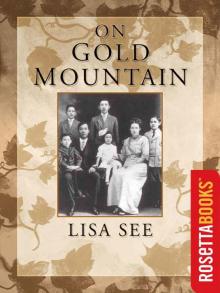 On Gold Mountain: The One-Hundred-Year Odyssey of My Chinese-American Family
On Gold Mountain: The One-Hundred-Year Odyssey of My Chinese-American Family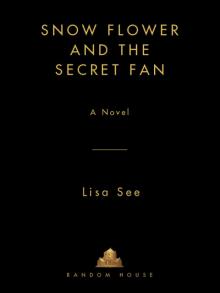 Snow Flower and the Secret Fan
Snow Flower and the Secret Fan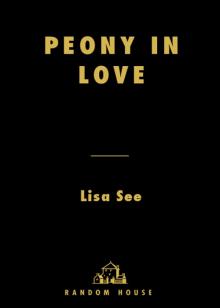 Peony in Love
Peony in Love Flower Net
Flower Net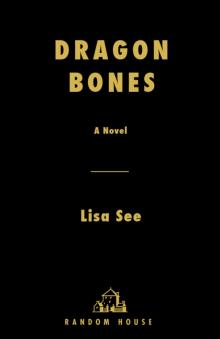 Dragon Bones
Dragon Bones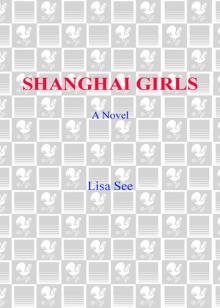 Shanghai Girls
Shanghai Girls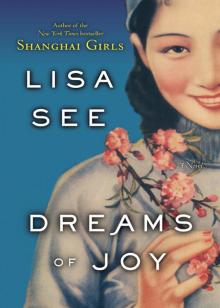 Dreams of Joy
Dreams of Joy The Island of Sea Women
The Island of Sea Women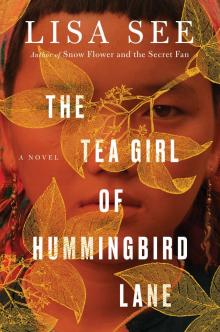 The Tea Girl of Hummingbird Lane
The Tea Girl of Hummingbird Lane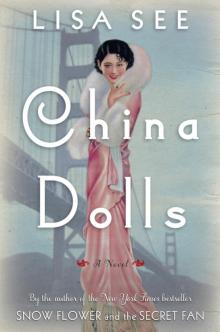 China Dolls
China Dolls The Interior
The Interior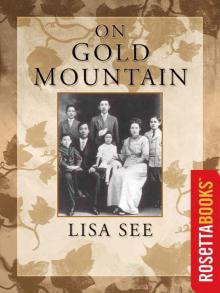 On Gold Mountain
On Gold Mountain